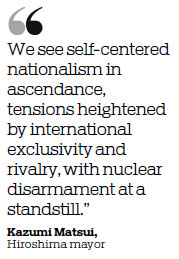Hiroshima marks 74th anniversary of atomic bombing
HIROSHIMA, Japan - Hiroshima marked the 74th anniversary of the atomic bombing of the city with its mayor renewing calls for eliminating such weapons and demanding Japan's government do more.
Mayor Kazumi Matsui raised concerns in his peace address on Tuesday about the rise of self-centered politics in the world and urged leaders to steadily work toward achieving a world without atomic weapons.
"Around the world today, we see self-centered nationalism in ascendance, tensions heightened by international exclusivity and rivalry, with nuclear disarmament at a standstill," Matsui said in his peace declaration.
He urged the younger generations never to dismiss the atomic bombings and the war as a mere events of history, but think of them as their own, while calling on the world leaders to come visit the nuclear bombed cities to learn what happened.

Matsui also demanded Japan's government represent the will of atomic bombing survivors and sign a UN nuclear weapons ban treaty.
Japan, which hosts 50,000 troops from the United States and is protected by the US nuclear umbrella, has not signed the Treaty on the Prohibition of Nuclear Weapons, which shows Japan's lack of sincerity, say atomic bombing survivors and pacifist groups.
The annual memorial ceremony, held at the Peace Memorial Park near Ground Zero, was attended by about 50,000 people, including representatives from about 90 countries and regions.
Survivors and other participants marked the 8:15 am blast with a minute of silence.
A uranium-core atomic bomb named "Little Boy", dropped onto Hiroshima in western Japan by a US bomber, exploded above the city on Aug 6, 1945, killing an estimated 140,000 people by the end of the year.
Nagasaki was also hit by an atomic bomb on Aug 9, 1945, prompting Japan's surrender and the end of World War II.
Japanese Prime Minister Shinzo Abe delivered a speech during the ceremony, stressing the importance of continuing efforts to realize "a world free of nuclear weapons".
As the only country that has experienced atomic bombings in war, Japan's duty to eliminate nuclear weapons remains unchanged even in the new Reiwa era, Abe said.
Japan is determined to serve as a mediator between nuclear weapon states and non-nuclear weapon states and take the lead in making such efforts in the international community, he said.
He also acknowledged widening differences between nuclear and non-nuclear states. "Japan is committed to serve as a bridge between nuclear and non-nuclear states and lead the international effort, while patiently trying to convince them to cooperate and have a dialogue."
He vowed to maintain Japan's pacifist and nuclear nuclear-free principles, but did not promise to sign the treaty.
Agencies - Xinhua
(China Daily 08/07/2019 page11)














